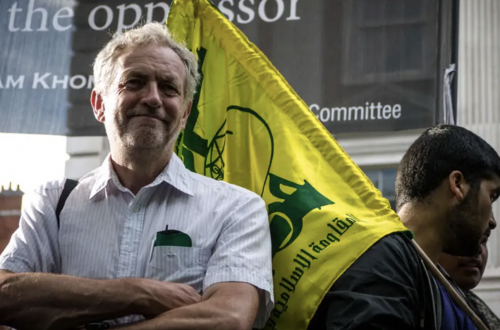This is a cross post from Point of No Return
It has become fashionable for academics in Middle East Studies departments to redefine the identity of Jews in Arab countries as ‘hyphenated’ Arab-Jews, conflicted by the Arab–Israeli dispute, itself an aberration after centuries of peaceful coexistence. But nothing the Jews could have done would have prevented their ethnic cleansing from Iraq, argues Lyn Julius in her review of New Babylonians by Orit Bashkin (Jerusalem Post):
Orit Bashkin, the Israeli-born associate professor of modern Middle East history at the University of Chicago, is the new kid on the block in the field of the history of the Jews of Iraq. She has painstakingly trawled through source material in Arabic, Hebrew and English to support her thesis: until their mass displacement in 1950, the Jews of Iraq, she maintains, were actually patriots and Arab nationalists.
Once the three Turkish provinces of the state had been thrown together by the British in the wake of the post-First World War collapse of the Ottoman empire, Jewish writers and intellectuals of the Arabic Nahda (Renaissance) in 1920s Iraq fully expected to have a hand in shaping the new nation’s culture. During King Faisal’s reign – the Hashemite monarch was installed by the British – some, she writes, began calling themselves ‘Arab Jews’.
Jews ‘appropriated (classical) Arabic’ and wrote using ‘Islamized’ terminology, references and pride in the Muslim past, and even viewed the Quran as a shaper of identity. As evidence, Bashkin quotes from newspapers edited by Jews, and stories written by them. Jews adopted ‘the anti-colonial interests of the Arab world’, emphasized their differences with western Jews, repudiated Zionism and proclaimed their support for the Palestinians. The Effendia, the urban Jewish middle class, propagated nationalism, she claims.
In the 1940s, disappointed with the way their nation was turning out, younger Jews especially, Bashkin argues, found another authentic expression of their patriotism when they joined the Iraqi Communist party, in what Bashkin (in contradiction to Batatu, the historian ‘par excellence’ of Iraqi communism) alleges were large numbers. Although the Jews were forced to emigrate from Iraq, even today their Muslim neighbours and friends, inspired by the writings of Jewish authors and the music of Jewish composers and singers, cherish the memory of a shared coexistence at variance with the current ‘binary’ view of Jews and Arabs as enemies.
Perhaps it is to emphasize the ‘Arabness’ of Iraqi Jews that Bashkin uses a bizarre spelling of proper names: Renee Dangoor becomes ‘Reene Dangur’ and Meir Basri becomes ‘Mir Basri’.
Bashkin draws much inspiration from non- or anti-Zionist academics such as Joel Beinin, Sassoon Somekh, Ella Shohat and Yehuda Shenhav. Her book carries a commendation by the Palestinian Columbia University professor Rashid Khalidi.
One historian whose writings patently had little influence on Bashkin is the late Iraq-born political scientist Elie Kedourie. ‘They [the Jews] were utterly without interest in this absurd attempt to form a nation’, he contradicts Bashkin in his Minorities essay in The Chatham House Version.
Bashkin’s title is New Babylonians, but there is little sense in Bashkin’s book that the shapers of the new Iraqi culture should incorporate myths and references from the country’s pre-Islamic and ancient Jewish and Christian roots. To her, the only authentic elements of nationhood are Arab and Muslim. She assumes that the Jews should adapt, adopt and appropriate these: yet their 2700-year-old culture was indigenous, and the Judeo-Arabic dialect they spoke was a purer form of Arabic than the adulterated Muslim speech brought into Baghdad by Bedouin migrants.
Kedourie narrates a significant episode in 1918 which barely rates a mention in Bashkin’s history. The collapse of the Ottoman empire had left the dhimmi Jews adrift as second-class citizens without the saving graces of communal standing and autonomy. A delegation of Jews petitioned the civil commissioner in Baghdad and asked to be allowed to become British subjects. They complained that the Arabs were politically irresponsible, they had no administrative experience and they could be fanatical and intolerant. The Jews made this demand, not once, but three times. The petition was not granted.
The Jews’ petition hardly suggests that most Jews were anti-colonial. Quite the contrary, Jewish clerks, merchants and administrators became the mainstay of British rule throughout the 1920s and 1930s. Furthermore, Bashkin underestimates the revolutionary impact of the Alliance Israelite school system, which oriented Jews decisively towards modernity and secularism. Alliance alumni felt just as at home in English and French as in Arabic, and absorbed western culture and philosophy.
Jewish nationalists did undoubtedly exist, but Bashkin seems to exaggerate their numbers and influence. The Nahda, when the Jewish Effendia aspired to be Iraqis first, and Jews second, lasted barely ten years under King Faisal (1883–1933). Thereafter, Nazi-inspired anti-Semitism began to make inroads. It was the fear of being identified with Zionism that forced the community leaders and public intellectuals, under duress, to make increasingly desperate but futile protestations of loyalty to the regime. The most desperate expression of all was the (Communist) League for Combating Zionism, applauded by Bashkin as the ultimate expression of Iraqi patriotism. It was nevertheless banned.
The author prefaces her book with the famous poem by Anwar Shaul:
I live under the protection of Muhammad’s religion,
I take refuge in the tolerance of Islam,
And my inspiration is the sublime language of the Quran,
I love of the nation of Muhammad. . .
Bashkin evidently takes this poem as a literal expression of how far Jews wholeheartedly identified with the majority Iraqi Muslims, but neglects to tell us that Shaul wrote the poem while his friend Meir Basri was in jail. The poem was actually a fawning attempt to flatter the government into releasing Basri.
Jewish writers could have adopted Arab and Muslim terminology and figures of speech not to show how Arabized they were, but because they saw their role as westernized agents of change. If they sought equality in the new Iraq, it is because they were unequal dhimmis in the past. But such vital context is missing in Bashkin’s book.
Kedourie considers that the Jews were doomed right from the start of the Iraqi experiment, but the conventional view among Iraqi-Jewish historians is that the cataclysmic event known as the Farhud – two days of murder, looting and rape in June 1941 – marked the decisive failure of the Jews to become accepted and equal citizens of Iraq. Thereafter younger Jews looked to either Zionism or Communism as their salvation. Claiming that Zionism attracted only a minority of Jews, Bashkin devotes a whole chapter to Jews and Communism.
Muslims who saved Jews in the Farhud, Bashkin believes, represented the triumph of friendship and good neighbourly relations. The turning point for Iraqi Jewry came much later – when state- sanctioned persecution began in earnest. She claims that the Zionist movement did not become popular until 1947 when it began to help smuggle Jews out of Iraq.
But what greater trauma can anyone experience than a massacre? Relying for your survival on the good will of your neighbour (Bashkin is honest enough to admit that neighbours also joined the rioters and looters) to defend you is hardly a mark of acceptance and success. It is more plausible that the Zionist underground began its resurgence immediately after the Farhud, offering training in self-defence, and stockpiling weapons.
To her credit, however, Bashkin does a thorough job documenting the mounting persecution of Jews at the end of the 1940s, culminating in the law criminalizing both Zionism and Communism. Refreshingly, she discounts the significance of the 1950–51 bombings of Baghdad beloved of Arab propagandists: the bombs were not enough to trigger the Jewish mass exodus. The leftist Bashkin blames ‘brutal right-wing nationalist activity’ and ‘the ineptitude of the Iraqi leadership’ for this campaign of ‘collective punishment’ of the Jewish community.
Bashkin’s approach, to detach social and cultural history from politics, can only lead up a blind alley. ‘The departure of Jews from Iraq is puzzling in retrospect’, she concludes, ‘considering the degree to which the Iraqi Jews were immersed in Iraqi life and culture.’
But it is not puzzling at all. Cultural affinities alone were never enough to guarantee peaceful coexistence between Arabs and Jews, any more than the acculturation of German Jews prevented their ethnic cleansing by the Nazis.
Anwar Shaul and Meir Basri were the epitome of Arabized Jewish culture. They stuck it out to the bitter end – enduring persecution, harassment and imprisonment until the 1970s, when they were among the last Jews to leave Iraq. Shaul went to Israel, Basri to England.
The question Orit Bashkin should be asking is why nothing the Jews did could have prevented bigoted Arab nationalism from treating even the most acculturated Jewish neighbour as an enemy, and destroying the world’s oldest diaspora community. New Babylonians does not provide the answer.
Abridged from a review in the Journal of Middle Eastern Studies, March 2014


